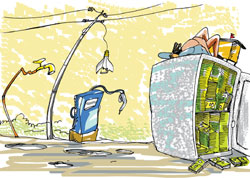|
|
| . The state treasury has a stash of Rs 15 billion in cash, enough to pay for half the cost of the Melamchi project. . Nepal Rastra Bank has Rs 177 billion in foreign currency reserves, enough for more than a year of imports. |
Looking around the country you wouldn't be able to tell, but Nepal is awash in cash.
One year after the return of democracy, investment is down, there is an oil shortage, water shortage, electricity shortage. District hospitals are still waiting for doctors, schools still don't have roofs, infrastructure damaged during the conflict still hasn't been repaired. Yet, paradoxically, the country's macroeconomic situation has never been better.
The treasury has Rs 15 billion in cash. The Rastra Bank has $ 2.5 billion worth of foreign currency reserves, enough to pay for more than a year of imports. The dollar has fallen by Rs 9 making imports even cheaper. Inflation is down and the balance of payments is looking good.
The internal borrowings target was Rs 18 billion, but there is so much liquidity that the government hasn't borrowed more than Rs 10 billion. In fact, in the past month the Rastra Bank has paid back Rs 9.3 billion worth of past treasury bills. On 22 May alone, Rs 2.9 billion was paid out. All this has increased liquidity in the financial market and put a downward pressure on interest rates.
Ideally, there should now be enough liquidity in the money market for new domestic investments so new jobs are created. But this is not happening because of continued political instability. Rastra Bank director Nara Bahadur Thapa says if only the constituent assembly election dates were to be fixed it would firm up the economy. "Because we don't have dates, there is less certainty all around," he says.
Other economists agree: having lots of cash in the bank is not necessarily a sign of good health. "There is so much to be done, but no plans. There is local demand for development but no mechanism to implement projects. There is money but no policy about priorities on spending," explains one Finance Ministry official.
Although there is now an interim government that includes the Maoists, Nepalis are still waiting for the peace dividend. "This is shameful, says the official, "it's like my pockets are stuffed with cash but my family is going hungry."
There was nearly Rs 45 billion set aside for development in the current fiscal year alone. But till mid-May not even Rs 14 billion of it had been spent.
And despite this there are long lines at gas stations. Nepal Oil Corporation is bankrupt because it has to subsidise fuel and the government refuses to lend it the Rs 6.5 billion it owes Indian Oil. The eight parties act as if they know nothing because they think raising fuel prices would be politically suicidal.
A senior Rastra Bank executive has an easy solution to the stalemate: "If raising fuel prices is politically not feasible, the government could extend a soft loan to NOC to pay up its debts. It's a win-win: oil supplies will resume, we won't be beholden to India and there won't be a political risk." But there seems to be no one willing to bell the cat.
Another reason for the pileup of cash in the treasury is that imports are falling. Last fiscal year, imports increased by 6.6 percent compared to the previous year and this year there has been a 1.1 percent decrease. All this points to stagnant production and it will have a negative impact on economic growth.



